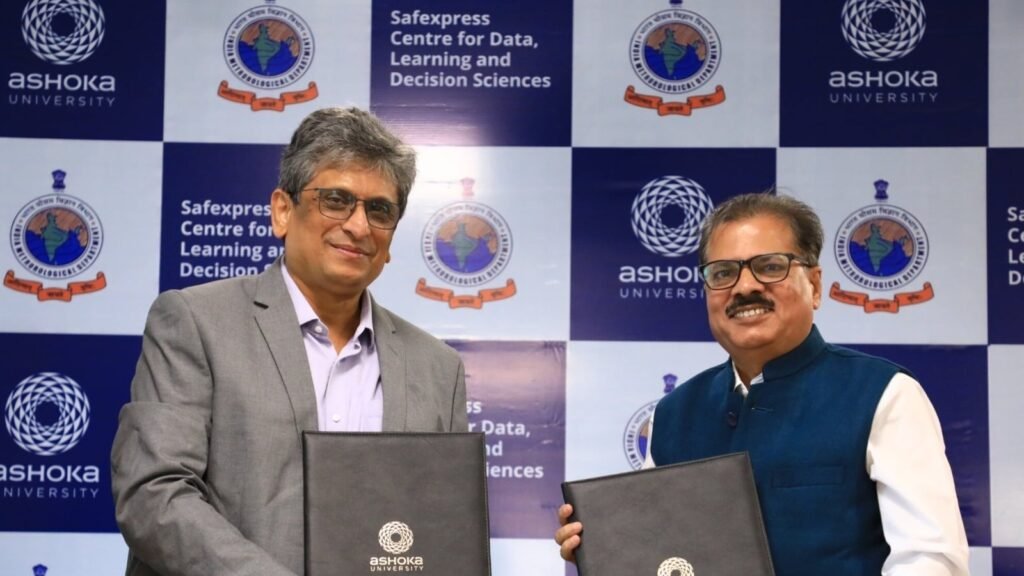Ashoka University signed a Memorandum of Understanding (MoU) with the India Meteorological Department (IMD), Ministry of Earth Sciences, Government of India. The collaboration is aimed at facilitating data sharing for solutions to key scientific and societal problems pertaining to weather, climate variability, forecasting, and disaster risk reduction.
The MoU was formalised during the 2nd Annual Workshop on AI/ML Methods in Weather and Climate Modelling, hosted by Ashoka University’s Safexpress Centre for Data, Learning and Decision Sciences (SCDLDS).
Also read: US CMA Certification: A complete guide for Indian students and professionals
The MoU promotes joint research initiatives across meteorology, climate science, atmospheric physics, hydrology, and environmental sustainability.
It will encourage the exploration of interdisciplinary topics such as impact of climate change, extreme weather events, air quality, and agro-meteorology, combining IMD’s observational datasets with Ashoka University’s analytical and computational expertise, a press statement informed.
Also read: Viksit Delhi CM Internship: 87 students chosen, to get Rs. 20K monthly stipend
Further, as part of the MoU, both IMD and Ashoka University will collaborate in the design and delivery of coursework, including lectures, practical training, fieldwork, examinations, and project guidance, in line with Ashoka University’s academic framework.
In addition, the collaboration also entails facilitation of student and researcher internships at IMD for hands-on experience with weather monitoring and forecasting.
Dr Mrutyunjay Mohapatra, Director General at IMD, shed light on the importance of collaboration with Ashoka University, and said that it is set to benefit both the institutions.
Dr Mohapatra added that the university will get IMD’s vast operational expertise and data resources, while Ashoka’s analytical and academic strengths will benefit IMD.
“Together, we can develop better tools, models, and knowledge systems that will benefit society at large,” he said.
Also read: AP Mega DSC Selection List 2025 released at apdsc.apcfss.in, check it here
Somak Raychaudhury, Vice-Chancellor of Ashoka University, said that the partnership with IMD represents a significant step in Ashoka’s commitment to interdisciplinary research with societal impact.
“By leveraging IMD’s extensive data and expertise, we will be able to contribute meaningfully to advancing climate science, improving weather forecasting, and preparing communities to adapt to the challenges of a changing environment,” he added.
Sandeep Juneja, Professor of Computer Science, Director of Safexpress Centre for Data, Learning and Decision Sciences said, “The new developments in machine learning in weather and climate modelling when combined with increased availability of large datasets and physics based classical weather and climate models, can dramatically improve extreme weather forecasts that may help in many ways including in saving lives and enhancing agricultural productivity.”
Notably, data sharing and management is a key component of this collaboration, wherein both institutions will establish clear protocols for secure and ethical sharing of meteorological, climatological, and remote sensing data with the university researchers, while setting clear guidelines on access, usage, storage, and intellectual property rights.
Apart from this, capacity building and training will be an integral part of the partnership. The institutions will organise workshops, short-term courses, and training programmes in meteorological data analysis, climate modelling, and computational methods.
Ashoka University and IMD will also jointly design and refine machine learning, and dynamical models for weather and climate applications, validating these tools using IMD’s historical datasets and Ashoka’s computational infrastructure, the release informed.
Meanwhile, a Joint Steering Committee (JSC) comprising representatives from both institutions has been established to monitor progress, hold periodic reviews, and ensure smooth coordination between research teams.

